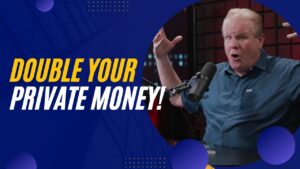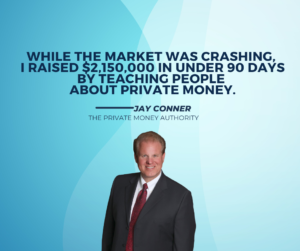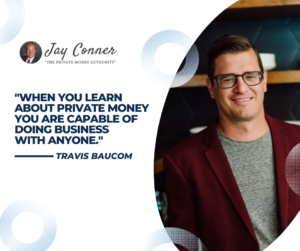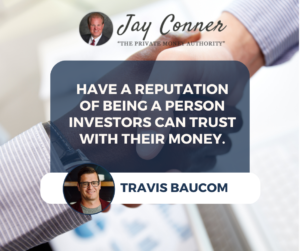Travis Baucom is the founder and CEO of Balcomie Capita and the former CEO of Texas Trust Home Buyers. With over ten years of investing experience, Travis is the driving force behind Balcomie Capital’s overall investment strategy, asset acquisitions, and business development activities.
As a hands-on leader, Travis personally selects all key investment markets and asset classes to ensure that the goals of his investors are met. Travis raised over five million dollars in private money last year, and this 2023 aims to reach ten million.
In this episode, we delve into raising and using private money and investing in self-storage—Travis chosen asset class. Tune in!
Key Takeaways:
- Investing in self-storage
- The more private money you have, the more offers you can make
- Why you should raise private money for your real estate business
- How Travis structures financing for his self-storage business
- Travis’ exit strategy in self-storage investing
- Where to find your first private money lender
- Typical returns from investing in Travis’ self-storage venture
Connect with Travis:
Website: https://www.InvestInStorageDeals.com
Check out my book: 7 Reasons Why Private Money Will Skyrocket Your Real Estate Business and Help You Build Incredible Wealth!
Get it here for FREE: www.jayconner.com/moneyguide
Sign up for the Private Money Academy and get 4-weeks free: https://jay-conner.mykajabi.com/offers/AMM4hCPW/checkout
Sign up for the Private Money Academy Conference: https://www.JaysLiveEvent.com
Timestamps:
0:01 – Raising Private Money with Jay Conner
0:02 – Today’s Guest: Travis Baucom
2:21 – How Travis Baucom Discover The World Of Private Money
7:38 – The More Private Money You Have The More Offers You Make
10:59 – Why Use Private Money To Fund Your RE Business
13:33 – Jay’s Free Money Guide: https://www.JayConner.com/MoneyGuide
14:17 – Investing In Self-Storage
21:27 – Raising Private Money For Self-Storage
23:15 – Where To Find Your First Private Money Investor
26:36 – Connect With Travis Baucom: https://www.InvestInStorageDeals.com
Raising Private Money For Self-Storage With Travis Baucom
[00:00:00] Jay Conner:
My guest today on raising private money, he’s actually raised 5 million of private money last year and this year. He’s on target to raise 10 million of private money for his real estate business. Imagine what you can do with this amount of private money burning a hole in your pocket. What asset class does he focus on?
He focuses on self-storage and Wow. If you are looking and interested in the passive way, To make a lot of money, then you’re gonna love this show. We’re gonna talk about private money, how he raises private money very quickly, and how he structures it, and then we’re gonna dive into how he actually does the self-storage business.
He’s got over 10 years of investing experience and asset development. So he’s got a lot to share. Al prior to becoming c e o of Balcom Capital, he was the c e o of the largest privately owned distressed house-buying company in the state of Texas, known as Texas Trust home buyers. He was buying all he, he bought over 400 single-family homes.
Within a five-year period. He developed and implemented the company strategy along with directing the asset acquisition and the management of those assets. In addition to his real estate investing experience, he and his wife have founded a private school focused on entrepreneurship. In just a moment, you’re gonna meet my good friend and fellow mastermind member Travis Baucom, right after this.
[00:01:41] Narrator:
If you are a real estate investor and are wondering how to raise and leverage private money to make more profit on every deal then you are in the right place on raising private money, we’ll speak with new end seasoned investors to dissect their deals and extract the best tips and strategies to help you get the money because the money comes first.
Now, here’s your host, Jay Conner.
[00:02:20] Jay Conner:
Travis, you have got a lot of experience in raising private money for this show. In this episode, I want to first talk about your experience, how you raise private money, how you find private money lenders, your talking points and et cetera, and then I want us to move over into the asset class that you just really love, which is.
Self-storage and how all that works together. But first, I’d love to hear what did your real estate investing business look like prior to getting involved in the world of private money and raising private money?
[00:02:56] Travis Baucom:
Yeah. So for eight years, from 2012 to, I guess six years, 2012 to 2018, we were primarily residential home buyers.
We’d buy houses through local banks. We had large lines of credit through local banks. We were buying in 49 different cities. In all in the state of Texas, we had some private money. We had one or two gentlemen that would have a line of credit, about 2 million bucks that we would always keep active mean.
We were always needing that money. We’d sell a deal and put it right into the next deal, so they never sat on their money too long. But. All good things come to an end for the most part. By 2018 a lot of the distressed houses had dried up. We bought over 400 houses during that six-year period.
And essentially I was massively burned out of buying houses, and so I ended up, we had a cash. A crisis where we needed to raise about 150 grand, easy money to raise. I could have done it, but I just chose not to raise it cuz I was so tired and so sick of buying houses. I was tired of smelling foreclosures.
I was tired of dealing with homeowners who thought they had a crown jewel of a house and it was really just a piece of poop. And so I just ended up shutting it down in October of 2018.
[00:04:16] Jay Conner:
I remember we were at one of the Mastermind meetings. You and I are actually in two masterminds together.
And I remember you telling me the story of just getting burned out on that end of the business. Now, Travis, my guess is that you probably had something come along in the business that triggered you. To really start focusing and raising private money. I know what my trigger was. I had my lines of credit at the bank from 2003 to 2009 and overnight, I lost my lines of credit because of the global financial crisis that was going on.
What got you started, or actually what happened in your business that you really started focusing on private money? Or is it because you primarily changed the asset class?
[00:05:08] Travis Baucom:
It was a little bit the of kind of the similar thing that you had to deal with. I was this, my first bank, a local bank lent me, first, lent me the money on my first deal, and gave me very favorable terms.
In a month I had it rented out. I went back to that bank and said, Hey, I wanna buy another house. I’m like we need to, we need to make sure this house is gonna work out before we lend you any more money here. And then, I was like do you have someone that could lend me? Is there another bank you could refer me to?
So he referred me to another bank, and that happened about three to four times. But then I couldn’t find another bank that wanted to lend me any money. I had four houses with debt. I had somewhere half a million dollars of debt and the value was 800,000 or 700, $800,000. So I had plenty of equity, but I didn’t have actually any cash in the bank.
That’s when I was like, I was a realtor at the time. I was showing this guy or this couple of some property, and I just, I remember him saying that his dad or his father-in-law had made some money sold the business, something like that, had some cash. I was like, Hey man, you think your dad. Do you think he would lend me money like 30?
I just need 40 grand for this house. It’s a really small house. I can get his money back in six months. Do you think he could do that at 8% or something like that? And he goes I’ll ask him. And so he asked he ended up getting on a phone call together and sure enough, he did that.
And so all of a sudden I opened up a completely different world that I didn’t know exist. I’d always been afraid of hard money lenders because they were 12 and a half, 13% with three points. I was like, man, I just, that just seems expensive. I’m borrowing money from this local bank here at five. And then this super nice gentleman who is really excited about partnering with me because he’s always wanted to do real estate.
He’s limited me money at eight and so this is great. And that kind of opened up. A new kind of era. In my business, I was buying like three or four houses a month, or excuse me, three or four houses a year. And it got to the point where I was with private money, I was able to buy three or four houses a month and then that turned into 10, 12, 15 houses a month.
So, that is what happened.
[00:07:10] Jay Conner:
Yeah. And the story you just shared emphasizes the point in this world of private money that you and I are talking about and that you and I work in, we’re talking about borrowing money. From individuals, from human beings. We’re not talking about institutional money.
You just mentioned hard money. So we’re not talking about borrowing money from hard money lenders, but we’re talking about doing business with individuals. So as far as it goes with doing business with individuals, how did it feel, Travis? You just said you were doing three to four houses, a year.
And then private money got you quickly to where you could do three to four houses a month. How did it feel when you were actually able to break through and finally realize that private money was the main thing that you were missing in your business? And then when you got it, look how much it scaled your business overnight.
[00:08:07] Travis Baucom:
Sure. Yeah, I definitely did. The, I’d say that the difference was I had a pretty good income as I was a realtor. Doing three to four a year. And then when I figured out that, oh, there are people out there that are just sitting on cash that is making six, 7% and they’re 401k and I can pay ’em eight to 10, then it got to be the point where if I had access to that money, I was going to find a deal and to put it in.
And I think that’s why, how I went, that’s how I went from like the three to four a year to the four. Four to 15 a month is because I’m like, all right, that guy says he has half a million bucks. That’s five houses in my market, so I’m gonna go find five houses that are good deals.
I’m gonna flip those, make some money, give it back to him, and then do it again. And so it was always this I, I went from a stand or a, a philosophy of here’s some deals that I can do. To this is if that guy’s money is available there I think in the atmosphere out there, in the universe, quantum physics here, that there’s a deal that money needs to go to and I’m gonna go find it.
And so I just my lifestyle and my business exploded in a good way for a very long time.
[00:09:18] Jay Conner:
I got the same experience, Travis, when we lost our line, and accredited the bank. This was in 2009 and of course, we remember what was going on in 2007, eight and nine. With the global financial crisis, we had all those foreclosures that were coming onto the market back then as well.
Banks wouldn’t loan money out. You had to have the money. And so now I learn about private money. It was a necessity if I was gonna stay in business. And so now I was able to attract $2,150,000 in less than 90 days. When I put on my teacher hat and just started teaching people that I have a relationship with what private money is and what self-directed IRAs are.
And isn’t it interesting in a market that was just crashing the first 12 months that I knew about private money our business tripled? Tripled because we had access to the money. And isn’t that funny? The more private money you have available, it just seems like the more offers that you make, right?
[00:10:24] Travis Baucom:
Absolutely. It’s a very empowering source of power. It’s when you have it you’re not, I wouldn’t say bulletproof, but you have the capability of doing things that other people won’t do in 2020. When things dried up similarly, for two months, I still had the relationships I had and so we ended up buying quite a bit of houses just in those two months, even though we weren’t house buyers.
I’m like, yeah, wholesalers were calling me that were typically wanting 1 10, 1 15. Man, I’ll give you this thing for 93 grand if you wanna buy it. I just wanna stick this whole lady with this house. I’m like, done deal. Let’s do it. It’s I love it. I love it.
[00:10:59] Jay Conner:
So what’s yours and the list is long.
But what is your favorite reason or reasons for using private money versus hard money? And before you answer the question, go ahead and define for the sake of our audience the difference between hard money and private money. And then what are your favorite reasons for private money? I know what mine are.
[00:11:22] Travis Baucom:
Yeah. I would say, I would define private money as an individual who has cash to lend to you in exchange for a first lien de of trust or a second lean de of trust. And then I would con, I would define hard money lending as private equity or institutional-backed, high-risk leveraged debt with a lot less.
Comfort in my opinion. There’s a hybrid, which is what I borrowed a ton of money from. And it’s like the guy whose, parents gave him 3 million bucks and he lends that money, and then he uses a line of credit at a bank to lend it even more money. That guy, me and hi, the first time I’m referring to, we are still very good friends.
We chat once a quarter, even though I don’t I don’t use this money anymore because I don’t buy houses anymore. So private money for me, the list is long. It put me in control of my business and put me in the driver’s seat when I’m teaching individuals what private money is and how they can get high rates of return safely and securely.
[00:12:29] Jay Conner:
I put the program together. It’s more or less not a negotiable program. When I was borrowing money at the banks and mortgage companies, they made the rules. The old mindset of borrowing money as you go into the bank and you get on your hands and knees and put your hands underneath your chin, you go, please fund my deal.
Please fund my deal. In this world, Travis, that you and I are in we’re not asking for a mortgage. We’re actually offering a mortgage. You put on your teacher hat I practice and teach all the time, Travis. The money comes first. I know you’ve heard it. I’ve heard it a hundred times.
Some people say, oh, just go get the deal under contract and the money will show up. And I go Where? Where’s the money gonna show up? It just doesn’t make any sense to me unless you’re wholesaling only and you’ve got a long list of real estate investors that can take a deal down.
I want us to, I really want us to have some conversation about self-storage and et cetera, but let’s give a gift away first to anyone that wants to get a fast start on private money. I have a recent money guide that I just finished writing called, seven Reasons Why Private Money will Skyrocket Your Real Estate Business and help you build incredible wealth.
If you wanna get on the fast track of beginning private money for your real estate deals, you can download this absolutely for free at www.JayConner.com/MoneyGuide. That’s www.JayConner.com/MoneyGuide for the fast track to private money.
[00:14:18] Jay Conner:
Travis, how long ago did you start migrating to self-storage and why?
[00:14:23] Travis Baucom:
Yeah. In October of 2018, I ended up closing mine. Operations down. We still owned a lot of houses. In fact, that company owned over 110 houses, 42 renovations, and 72 rental properties that weren’t doing well. So let’s just say that. And I, as previously mentioned, I had a, we had a cash issue.
I closed my business down or closed my operations down, and I went, I took my money, or I took all my files and I started trying to organize a situation that was outta control. And so after about. 24 months, I was able to get out of that situation. However, like 12 months in, I’m like, I’m gonna be able to get outta this.
This is good. I thought I was gonna have to file for bankruptcy. I didn’t think I was gonna have to get out of it, or I didn’t think I was gonna be able to get out of it. But if you just wake up and you just do what you’re supposed to do and you tell people that this is my plan, this is how I’m gonna get your money back, this is how I’m gonna get out of the situation, I’ve got into.
Then it’s amazing that if you just take it a day at a time, eventually you will be out of those situations you got yourself into. And so as I was coming out of that, I was like, I’ve got to pick an asset class. That, for me, is less operationally intense. So on a house-flipping property, you’re making 58 to 110 decisions.
Just to get that house ready to sell and then you’re hoping a real estate agent will bring someone that will have an emotional experience at your house and will say yes to it. And I just needed to get out of that. I didn’t want to compete with the Uber drivers on the this guy’s offered me this much, this guy’s offered me this.
I didn’t wanna compete with the wholesalers or the teachers or people that are doing this part-time. I wanted to play a way bigger game, and I also wanted to play a way bigger game in an asset class that had a historical. The default rate of under 1%, even in 2008. And so I was like, what asset classes that is?
And as I was figuring that out, that was storage. And so I read all the books on storage facilities on Amazon, which were only three. And then I just basically absorbed all the information I can. Could, and then I texted a few buddies and said, Hey, do you know about this asset class, do you know about in this asset class I’m trying to connect and learn all I can about this.
This is where I’m headed next. And that was really the reason why I got into storage. It was because of housing. Did not provide the amount of equity and amount of wealth accumulation that I wanted to, cuz the house is only worth the same amount as the house next door because an appraiser appraises it as a comparison approach.
So the house next door is worth 300 grand. There’s a good chance your house is gonna be worth somewhere around 300 grand. But a storage facility is based, they value it based on an income approach. On a cap rate or a yield basis. And so you could have two storage facilities right next to each other, but one of ’em is making 150 grand net every year, and one of ’em is making 85 grand net every year.
The one that’s making 150 grand is gonna be worth, substantially more than the one that’s only make making 85 grand a year. But by the way, if you come to that scenario, the one that’s worth only making 85 grand is the same square feet, you probably should buy that one because. Because you can make more money cuz the one next door is making 150 grand.
But that’s essentially why I switched over. It was just I need to not have as many plates spinning in the air. And I feel like when you’re flipping 10, 12 houses a year or a month, you’re spinning a lot of plates. You have to have a huge organization. We had 300 utility bills at one point with all of our water, electricity, and gas, on all of our flips, and all of our rental properties.
Just way too much of an operational suck than what I wanted. I wanted something that was very simple so that I could go mountain biking and not worry about it. Is something catastrophically happening that I’m not hearing about cuz I don’t have my phone on me?
[00:18:11] Jay Conner:
Makes a lot of sense. The benefits, you just started talking about it, the benefits of self-storage and this asset class it’s much less stressful than it sounds on the operations of it because, Not nearly as many decisions to be made.
So it’s much more passive, right? For sure. What are your, so in a moment we’ll move into talking about how you structure the financing when you’re raising money, and how are you raising money for these storage facilities? But what do you look for in a self-storage? I assume you’re buying and investing in existing self-storage and not building new self-storage facilities, or are you?
[00:19:01] Travis Baucom:
Yeah, we’re actually about, we’re raising capital right now as we speak for our first large ground-up self-storage facility.
We’ve done a few expansions 20,000 square feet expansions, 30,000 square feet expansions, but we’re building the ground up when it’s a piece of grass right now. And we’re building that From the ground up, extra Space is gonna manage it. And Extra Space is the second largest storage facility owner in America, and they’ll probably end up buying it once, we get it stabilized.
That tends to be something that they do. But generally speaking, all the ones that we’ve done previously have been purchases with an intent to add square feet to, or with an intent to expand them.
[00:19:45] Jay Conner:
So what do you look for in deciding that you want to invest in an existing storage facility, and what is your typical exit strategy?
[00:19:55] Travis Baucom:
Yeah, there are a few things you look at on the facility level. It’s, but the most important thing to look at is actually the five or four-mile radius of where that facility is. You wanna count all the other storage facilities up. You wanna see how they’re performing. You gotta call ’em secret shop, say, Hey.
Hey, do you have a 10? Do you have five, 10 by tens available? If and if they’re like, oh yeah, we got plenty available, then you know that the demand isn’t that strong. But if they’re, if they were said, you’re like, we got nothing, everything’s full. And if you find that kind of to be the case around the whole four-mile radius, then you probably have a lot of demand for storage in that area.
And you just need to buy a facility cuz you at that point you can expand it and there’s plenty of room for demand and also increase your rents. And so it’s kinda a one-two punch. You win both ways, but yeah, you’re always looking for de the demand. Facility level wise, you’re looking, making sure, like things like you got the right doors, you got the right unit mix, you got the right gate size.
If you have a gate that’s 12 feet wide, you’re gonna have a hard time getting a 24-foot U-Haul trailer or van side there. So you want bigger gates. You need to have a, typically an office. We want every facility we own. Either need to have cameras in lights or if they don’t, we need to be able to put them in there and we need to get compensated for doing that.
Typically by offering ’em a little bit less than what they’re wanting.
[00:21:26] Jay Conner:
I got you. So how do you structure the financing for these self-storage units?
[00:21:35] Travis Baucom:
Yeah, so these are big purchases, 2 million to 6 million. The ground-up one we’re doing is we’re getting a 13 million loan on it. And we typically 75 25 loans.
So that means 75% of it comes from the bank. 25% of it comes from limited partners or private lenders that they’re private lenders that have equity pos, they have eq, and they own equity in the facility as well. And then we raise 12 months of mortgage payments regardless if it’s a stable facility, meaning it has 90% occupancy.
We raised 12 months of mortgage payments just in case a rainy day or something were to happen. Then if it’s a ground-up storage facility, we actually raised 36 months. Of mortgage payments. Cause it’s gonna take 12 months or 12 to 14 months to build, then 24 months to fill up. And then we’ll then it’ll be, then the facility will be paying its mortgage at that point.
In addition to that, we charge fees on top of those things. Those fees are typically three to 5% based on what we are doing and how we’re structuring the deal. Oh, and then equity wise the general, it’s typically a general partner, limited partner setup. The general partner gets 40 to 60% of the ownership, and then the limited partners get 40 to 60% of the inverse, the 60 to 40% of the ownership.
However, with that said, we make sure that our limited partners get their money back before we get, the general partner, which is me and my partners get any cash distributions.
[00:23:07] Jay Conner:
So when you’re out attracting and raising private money for these types of projects where do you find your private lenders and how do they learn about the opportunity?
Other than on Jay Conner’s podcast.
[00:23:22] Travis Baucom:
Yeah, that’s the biggest source of private lenders. I’m just kidding. Yeah. We just are getting our name out there. We got a social media channel. We’ve got some articles written about our company. We’re doing a lot of podcasts. But thankfully being in the business for 10 years, I’ve made a reputation for myself of being a guy that you can trust with your money.
And so we borrow money from attorneys. We borrow money from the dentist. They’re what’s considered accredited investors, so they make at least $200,000 with a net worth of a million dollars not including their primary residents. And yeah, we, so we grocery store owners, business owners financial advisors, all of those people we’re sourcing capital from, but primarily the, normally it’s it’s business owners are probably the number one.
A place that we borrow or that we get money from. Primarily cuz they want, they realize real estate is an incredible vehicle for generating wealth, but they don’t have the time cuz they’re running their HVAC company or they’re running their credit union software company or they’re running their grocery stores.
And so it’s, they don’t have time to invest in real estate or at least learn how to invest in real estate. So they trust us with their money.
[00:24:37] Jay Conner:
What is your minimum investment for someone to get involved and? Invest in your capital company?
[00:24:45] Travis Baucom:
Yeah. It’s normally 50 grand is our base minimum.
It gets we don’t offer a preferred return at 50 grand, which is basically a return that you get regard before the equity distribution gets paid out. Before that, we, the G general partners get paid. So I would say 50 grand, but there are a lot more incentives for the 250 grand and up. The preferred returns are better typically, and then you can partner.
If you don’t have 250 grand, you can get a couple of your buddies or three of your buddies and create an LLC, put money in there, and invest 250 grand in our next deal. That’s totally acceptable. So collectively, you’re making a better return.
[00:25:22] Jay Conner:
What typically Travis what kind of returns can your investors typically expect to get?
[00:25:29] Travis Baucom:
Yeah, our, the preferred returns, which again, is that return you get before anyone else gets a payment. That’s anywhere from four to 10%. I would say the average is 7% and the 10 percent’s for a million bucks plus that sort of thing. So most people are giving us 250 to 500 grand at a time.
That’s a six to 7% return. In addition to that, if you remove the preferred return and just Have a five-year investment strategy. You’re going to be getting your money back somewhere between 14 months and 28 months. And then you’re gonna be, we’re gonna be selling that asset within five years, which is where you typically make a two extra return on your money.
So you’ll probably make six to 8%, six to 8% return on your money every year. And then at that, then when we sell it, that’s where that two x comes.
[00:26:17] Jay Conner:
That’s awesome. I can speak from experience. I have known you for quite a few years now, Travis. You’re one of the most trustworthy people I know.
Ethical. You take care of other people. You’ve got a servant’s heart, you know how to run a business and you know how to treat people, so I’m sure we’ve got some listeners and or viewers here that will be interested in reaching out to you and having a conversation. What’s the best way for my audience to get in touch with Travis Baucom?
[00:26:50] Travis Baucom:
Yeah you can reach out on our website, it’s www.InvestInStorageDeals.com
[00:27:09] Jay Conner: So that website again www.InvestInStorageDeals.com and Travis will be right there, ready to talk to you.
Travis parting comments?
[00:27:23] Travis Baucom:
I don’t have any. I appreciate you, I’ve enjoyed this. I’ve appreciated you having me on.
[00:27:28] Jay Conner:
Absolutely. Travis. Thank you for taking the time to join me here in raising private money.
And there you have it, my friend. Another episode, an amazing episode of Raising Private Money with Jay Conner. Be sure and if you’re watching on YouTube, be sure to subscribe and ring that bell so you don’t miss out on any more of the upcoming.
Tap those three dots and click follow me, and we really appreciate the five-star reviews. Look forward to seeing you right here on the next episode of Raising Private Money. Here’s to take in your business to the next level. We’ll see you right here at the next show.
[00:28:13] Narrator
Are you feeling inspired by the knowledge you gained in this episode?
Then head over to www.JayConner.com/MoneyGuide. That’s www.JayConner.com/MoneyGuide and download your free guide that shares seven reasons why private money will skyrocket your real estate investing business right now. Again, that’s www.JayConner.com/MoneyGuide to get your free guide. We’ll see you next time on raising private Money with Jay Conner.






